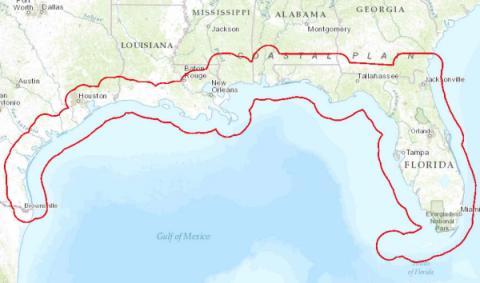Plan providing $291M for 69 Projects across 23 Coastal Counties
Last week, U.S. Environmental Protection Agency (EPA) Acting Administrator Andrew Wheeler sent a letter to Mr. Noah Valenstein, Secretary of the Florida Department of Environmental Protection (DEP) and Designated Alternate for the Governor of Florida to the Gulf Coast Ecosystem Restoration Council  (RESTORE Council), approving the State of Florida’s State Expenditure Plan (SEP) developed by the Gulf Consortium (designated entity for Florida under the Spill Impact Component funding).
(RESTORE Council), approving the State of Florida’s State Expenditure Plan (SEP) developed by the Gulf Consortium (designated entity for Florida under the Spill Impact Component funding).
“I applaud Florida and the Gulf Consortium on the development of this comprehensive and effective State Expenditure Plan that will provide $291 million for 69 projects spread across 23 coastal counties to restore water quality, protect wildlife, and revitalize the Gulf economy,” said EPA Acting Administrator and RESTORE Council Chair Andrew Wheeler. “Our collective efforts under the RESTORE Act will help protect and ensure the long-term health and resilience of the Gulf Coast ecosystem.”
“I am proud to announce the approval of Florida’s robust plan to invest more than $290 million in critical projects along Florida’s Gulf Coast,” said Florida Governor Rick Scott. “The communities impacted by the Deepwater Horizon Oil Spill have come so far since that tragic disaster and we will never stop fighting to protect our environment and make sure families and businesses along the Gulf Coast continue to grow. The approval of this funding is great news and I look forward to continuing our good work with all of our partners to take care of Florida’s Gulf Coast.”
“We are very excited about the approval of the Florida State Expenditure Plan. This is a culmination of 5 years of work and cooperation with and between federal, state and local governments. This ambitious plan implements environmental restoration projects across 23 counties from the Perdido River in my county of Escambia to Key West in Monroe County,” said Gulf Consortium Chairman Grover Robinson. “I am incredibly proud of the work that has been done and the goals that will be accomplished to make Florida better. Thank you to everyone who participated in this endeavor and all Floridians will benefit from this effort.”
“I would like to thank the Gulf Consortium for developing a plan that includes a diverse suite of projects and programs that focus on environmental restoration and protection of water quality and coastal resources and promotion of tourism along our Gulf Coast,” said DEP Secretary Noah Valenstein. “Florida’s counties clearly recognize that healthy ecosystems, fisheries, marine and wildlife habitats, beaches, and wetlands are inextricably linked to our state’s economy.
The Florida SEP was submitted under the Spill Impact Component of the Resources and Ecosystems Sustainability, Tourist Opportunities, and Revived Economies of the Gulf Coast States Act of 2012 (RESTORE Act). With this approval, funding for activities in the SEP will be disbursed via federal grants between the Council and the Gulf Consortium. The approved SEP is posted on the RESTORE Council website.
Background
 The RESTORE Act established the RESTORE Council and the Gulf Coast Restoration Trust Fund (Trust Fund). It dedicates 80 percent of Clean Water Act civil and administrative penalties resulting from the Deepwater Horizon oil spill to the Trust Fund, for restoration projects in the Gulf Coast region.
The RESTORE Act established the RESTORE Council and the Gulf Coast Restoration Trust Fund (Trust Fund). It dedicates 80 percent of Clean Water Act civil and administrative penalties resulting from the Deepwater Horizon oil spill to the Trust Fund, for restoration projects in the Gulf Coast region.
The RESTORE Council is responsible for administering 60 percent of the total funding allocated from the Trust Fund: 30 percent (plus interest) under the Council-Selected Restoration Component and 30 percent under the Spill Impact Component. The RESTORE Council is chaired by EPA, and members include the governors of: Alabama, Florida, Louisiana, Mississippi, and Texas, as well as the secretaries of the U.S. Departments of Agriculture, Commerce, Homeland Security, the Army and the Interior.
The RESTORE Council is responsible for helping restore the ecosystems and economies of the Gulf Coast region by developing and overseeing implementation of a Comprehensive Plan and carrying out other responsibilities. The Gulf Coast ecosystem is one of the most diverse environments in the world and home to a wealth of wildlife, valuable natural resources, abundant seafood, extraordinary beaches and recreational activities, and a rich cultural heritage.
Learn more about the RESTORE Council at www.restorethegulf.gov.
Source: U.S. Environmental Protection Agency
Share this Post










